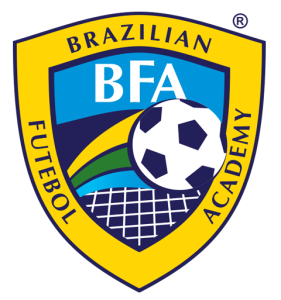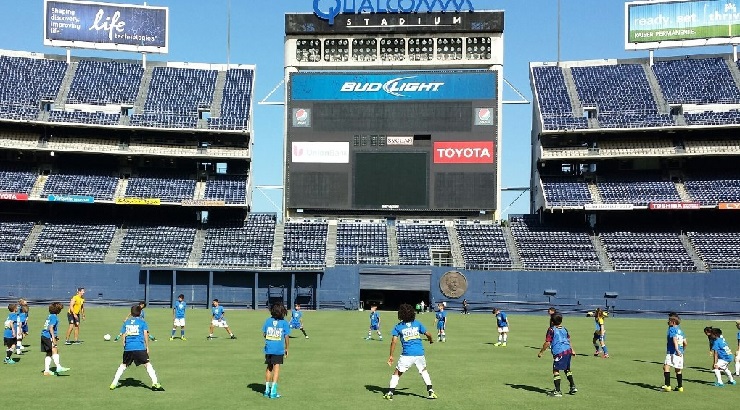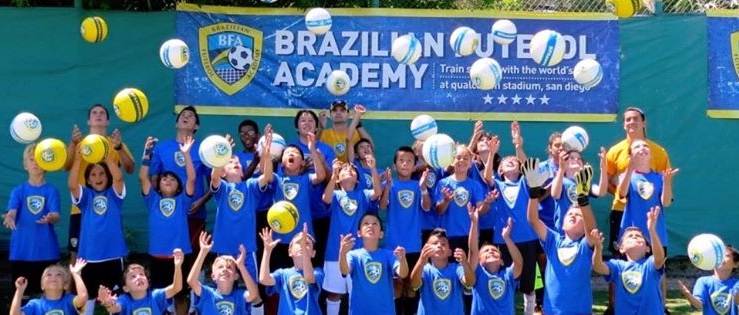Soccer News: Learn Brazilian Soccer In San Diego
The Brazilian Futebol Academy (BFA) is a premier soccer academy located at Qualcomm Stadium in San Diego. The coaching staff is composed of top soccer professionals highly specialized in player development. Their strategic partners include FIFA World Champion Cláudio Taffarel and Futsal World Champion Eduardo “Morruga” Valdez Basso.
Located in beautiful Mission Valley, Brazilian Futebol Academy (BFA) offers it all. They provide soccer and futsal training on a year-round and seasonal basis for players ages 6 to adult.
 Rogério (Roger) Carlson, is the Co-Founder and Director of BFA. Roger has extensive knowledge of soccer and futsal, having played, studied and followed the sports for over 30 years, participating in several soccer seminars and workshops with some of Brazil’s best coaches and managers. He attended the School of Physical Education at the Federal University of Rio Grande do Sul (UFRGS) in Brazil, studying Soccer and Futsal Training methodologies. His futsal professor was Alexandre “Barata” Zilles, two-time Futsal World Champion for Brazil.
Rogério (Roger) Carlson, is the Co-Founder and Director of BFA. Roger has extensive knowledge of soccer and futsal, having played, studied and followed the sports for over 30 years, participating in several soccer seminars and workshops with some of Brazil’s best coaches and managers. He attended the School of Physical Education at the Federal University of Rio Grande do Sul (UFRGS) in Brazil, studying Soccer and Futsal Training methodologies. His futsal professor was Alexandre “Barata” Zilles, two-time Futsal World Champion for Brazil.
Summer Soccer Camp Info:
Location: Qualcomm Stadium
Ages: 6-15
Dates: July 13-17, July 20-24, July 27-31, August 10-14, August 24-28
Cost: $175 Half-Day (9am-12pm), $275 Full-Day (9am-3pm)
2015 Camp Pricing Discounts (cannot be combined)
– Siblings: Receive $20 off half-day camp and $35 off full-day camp for each additional sibling attending same camp.
– New Referrals from Current BFA Participants: Bring a new participant to BFA and receive $20 off same half-day camp and $35 off same full-day camp.
– Multiple Camps: Receive $20 off regular price half-day camp and $35 off regular price full-day camp for each additional camp attended.
– SoccerToday Readers: Mention SoccerToday and receive $20 off a full-day camp! (Limited)

SoccerToday spoke with Carlson about the academy, their upcoming summer camps and the differences of Brazilian and American soccer.
Diane Scavuzzo: How long have you been running this program?
Roger Carlson: BFA is operating its fourth year here in San Diego. BFA offers year-round soccer training programs for competitive and recreational youth and adult players, summer camps, futsal training, 7v7 leagues, and after-school programs. BFA offers excellent soccer training in a convenient and safe environment at Qualcomm Stadium.
Diane Scavuzzo: What makes your academy unique?
Roger Carlson: BFA’s strategic partners include World Champions in both soccer and futsal. Our World champion connections provide us a wide network of high-level professionals and experts so that our academy staff can be up-to-date with the latest training methodology. One example is the close relationship we have with the youth academy directors and coaches of Internacional, a major professional Brazilian club ranked #1 in player development. Our coaching staff can travel to Brazil each year, participate in training sessions, and discuss training methodologies with their coaching staff.
BFA’s coaching staff is diverse. Having studied soccer and futsal coaching methodologies at top universities in Brazil and Europe, our coaching staff has engrained knowledge of these sports from not only an educational perspective but also from hands-on experience, growing up playing soccer and futsal, and participating in modified “street games” that expand a player’s creativity, strategic thinking, and improvisation skills.
This combination of international coaching experiences, our knowledgeable coaching staff, and noteworthy connections all lead to the unique coaching methodology and philosophy that BFA offers. Our friendly coaches provide training in a positive learning environment, with high-quality equipment with individual attention to ensure player improvement, all while maintaining optimal coach-to-player ratios.
Diane Scavuzzo: What makes your camps special?
Roger Carlson: Our coaches have a genuine interest in seeing each participant improve. BFA has created a thorough and comprehensive plan for both the full-day and half-day weeklong camp that includes warm-up exercises and games, coordination, speed and agility exercises, individual skills and group training, field activities, and small-sided games and scrimmages. Each day a Brazilian soccer move is introduced and practiced in a progressive way to be applied in game situations. On the final day of each camp, our players participate in “Futebol Olympics,” a team-based series of competitions. This is always a huge hit with our campers. In addition to our local participants, players from other countries have also attended our camp, creating an appealing multi-cultural soccer experience.
Diane Scavuzzo: Who should attend? Is there a specific level of player? How competitive is the program?
Roger Carlson: Our camps are suited for both competitive club players and recreational players. Our coaching staff has had extensive experience with youth soccer players of all ages and levels, from beginners to advanced, and looks forward to working with every player. We do our best to group players according to their age and level.
Diane Scavuzzo: What is the coaching to player ratio?
Roger Carlson: BFA’s coach-to-player ratio during camps is 1 coach for every 6 to 8 players. Our year-round training program also maintains a low coach-to-player ratio to provide quality individualized attention to each participant.
Diane Scavuzzo: Do players get to ask you questions about your experience?
Roger Carlson: Yes, our players and even parents are curious about soccer in Brazil. We talk to them about a variety of topics including how we grew up playing; what kids in Brazil do and how they play (not only training but also “free play” time); how attending live games in stadiums and watching professional soccer on TV inspired us to practice that much more. Exposure to such activities fosters a passion for soccer and builds the intrinsic motivation that drives a player to further develop his/her skills.
 Diane Scavuzzo: Can you comment on what the Brazilian style of the game is and compare/contrast it to the American style of play?
Diane Scavuzzo: Can you comment on what the Brazilian style of the game is and compare/contrast it to the American style of play?
Roger Carlson: Brazil’s main sport is soccer and our country has historically produced a large pool of talented players at all age levels. Most players grow up playing soccer on a daily basis with friends, training in soccer academies and clubs, and playing pick-up games. As a result, Brazilian soccer players are generally skillful. Historically, the US has played more of a physical and “mechanical” game, more “obedient” to tactics, thus producing a more predictable game. On the contrary, a Brazilian player can be more creative and less predictable. Brazilian players combine tactical aspects with refined technique and creativity, creating the jogo bonito. It is important to note that with the sport growing in popularity here in the US, more talented players are being developed. Combining this with their athleticism and tactical awareness, the US team is destined to become a strong contender. In fact, the US team has been playing well against traditional soccer nations, as recent results have shown.
Diane Scavuzzo: Can you describe the differences in Brazilian culture regarding soccer compared to how it is embraced or not embraced in the United States?
Roger Carlson: In Brazil, soccer is part of our culture instilled in us at an early age. In fact, a common gift for many toddlers is a soccer ball. Soccer is a sport passed down from a father/older sibling to a child at an early age. It is often played with friends even before there is a strong grasp of all the rules. This is how we grew up. Attending professional games with your family and/or friends and learning how to be a fan of that team…these are the kinds of things that makes a child more and more interested in playing the game and dreaming of one day becoming a professional player. Perhaps this could be likened to the spread of traditional sports such as baseball and American football here in the U.S.
In the U.S., because soccer hasn’t historically been the main sport and competes with other after-school activities, a child doesn’t have as much opportunity to play the sport as often, in both formal and informal settings, and when he/she does it seems there is a tendency to be “over-organized”, thus limiting a player’s development and creativity. Also, we see people in the U.S. saying, “this is the magic formula, that’s why so-and-so is a great player”. The reality is that there is a combination of factors, training methods, and games, etc., that rounds out a player’s development, and BFA is dedicated to replicating that combination. We believe that if a child in the U.S. played soccer the way we played it growing up in Brazil, he/she would enjoy the game more, and the U.S. dropout rate would not be 70% by age 13, as research shows.
 Diane Scavuzzo: Who are your favorite players/coaches?
Diane Scavuzzo: Who are your favorite players/coaches?
Roger Carlson: I grew up watching players like Zico and Falcão in the ’80s. They were part of what is considered one of the best teams of all time, the 1982 Brazil World Cup Team. I also liked watching Romário and Ronaldo, from Brazil; Ronaldinho when he was at his best form and was selected player of the year in 2004 and 2005; Zidane; and current players like Messi and Neymar.
Diane Scavuzzo: Do you model your coaching after specific Brazilian players/coaches?
Roger Carlson: We are fortunate at the Brazilian Futebol Academy to have access to some of the best youth and professional soccer and futsal coaches in Brazil, and to be able to discuss training methodologies and proven ways for its application in training sessions. We incorporate what we see works well with those top youth coaches with our own style and experience, and the needs of the players.
More about Roger: Carlson holds a Master’s degree in Sport Management from the University of Illinois. He also holds a post-graduate degree from Fundação Getulio Vargas in Brazil, and an undergraduate degree from Unisinos University, Brazil, where he graduated with highest honors while fulfilling an athletic scholarship. At Illinois, he worked in marketing projects involving the Chicago Fire (MLS), Arizona Diamondbacks (MLB) and Chicago Bears (NFL). He also worked as a research analyst for projects in sport marketing, consumer behavior, fan development, and community recreation. In 2005, he was invited to be a lecturer for a Sport Marketing program in Brazil created by ESPM University in partnership with soccer club São Paulo F.C.






